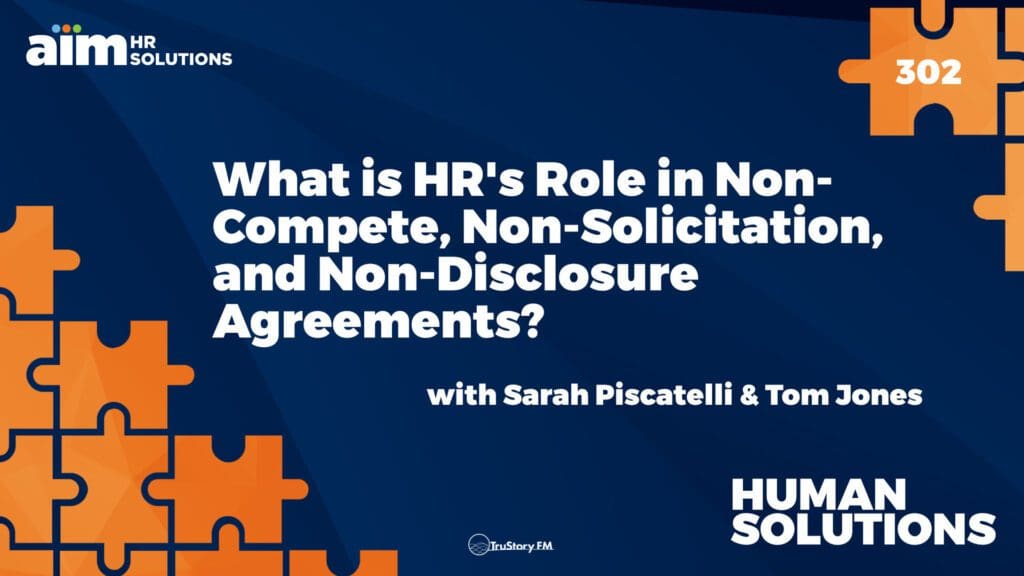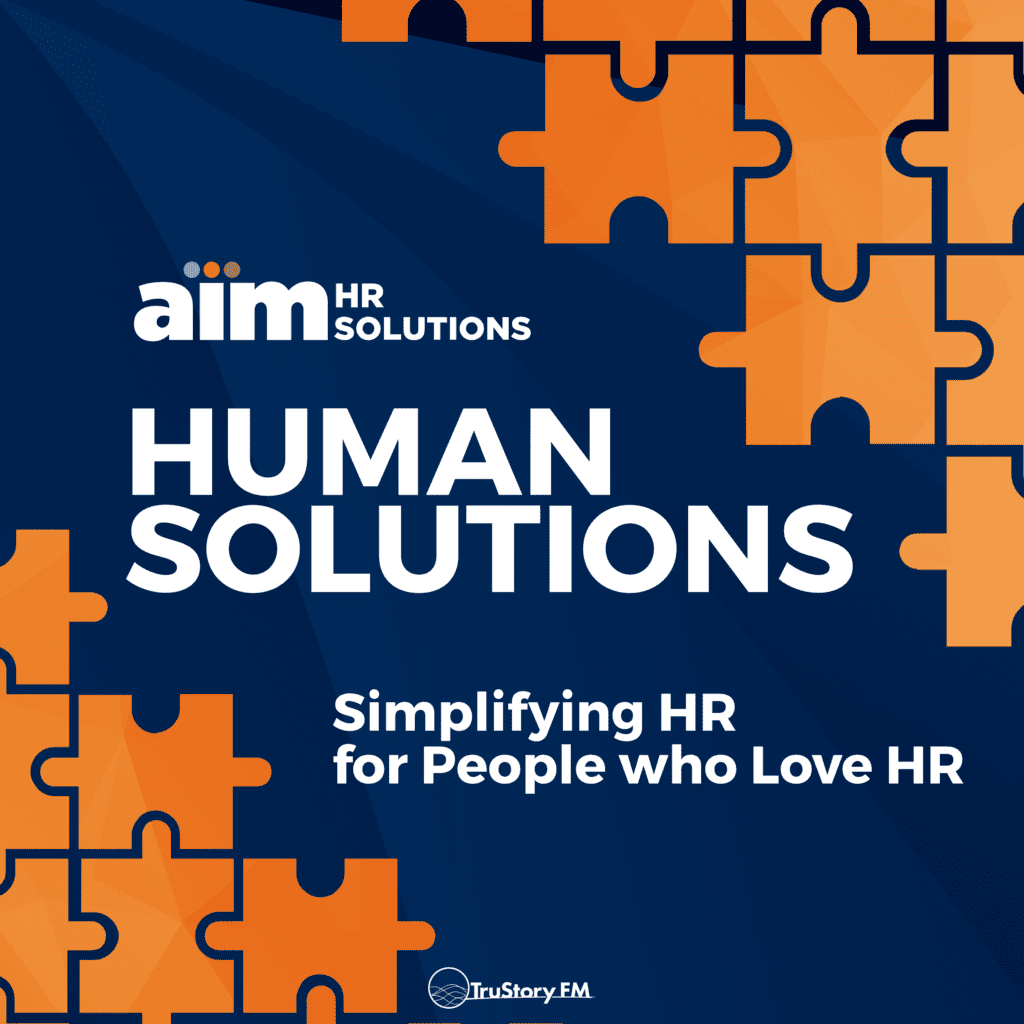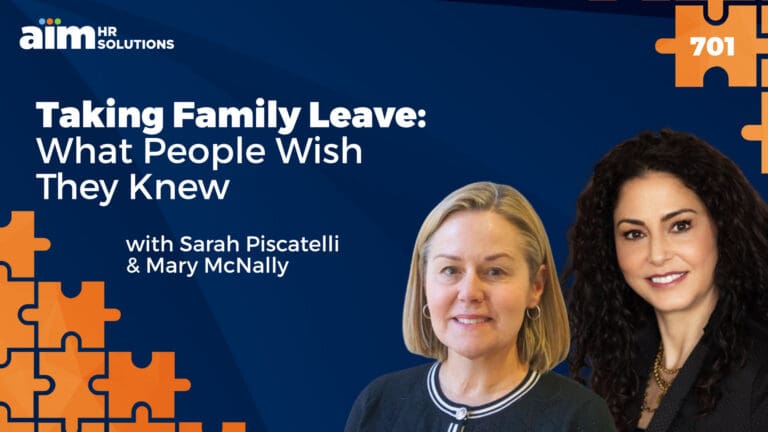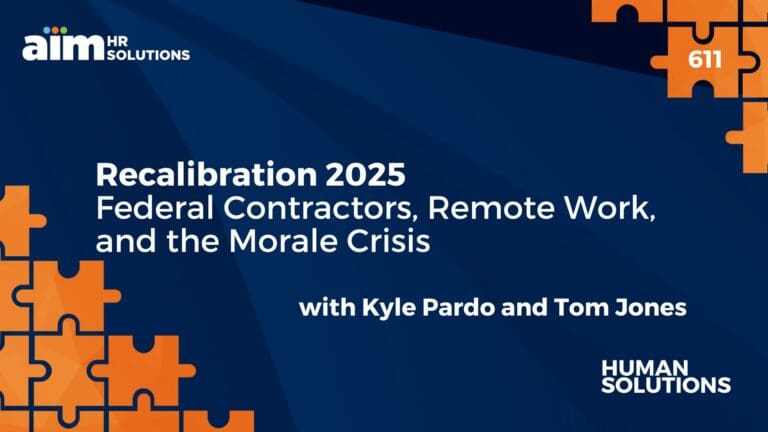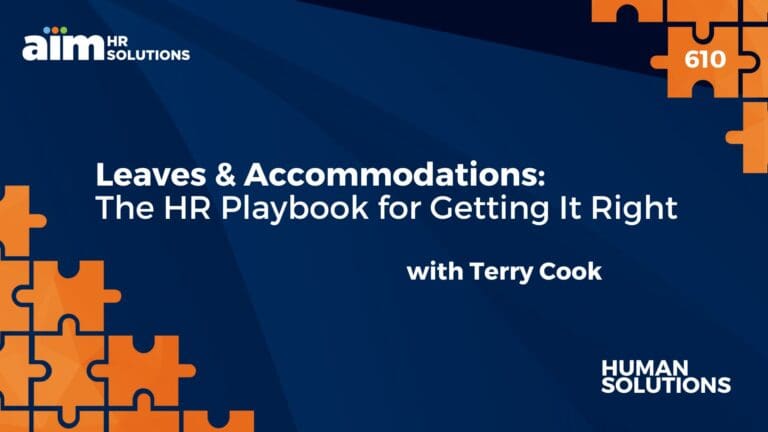Non-Compete Agreements are a hot topic in HR right now, thanks in no small part to the FTC and NLRB proposals in the news. As an HR pro, what do you need to know? AIM HR Solutions’ employment lawyers Sarah Piscatelli and Tom Jones join Pete Wright to share what you need to know to ensure your organization is developing an intelligent non-compete policy. They’ll also share their experiences in dealing with everyday challenges, such as determining the scope of the agreement and dealing with potential legal challenges from employees.
We will guide you through the maze of non-compete contracts, offering practical tips and insights to help you become a more knowledgeable and influential HR professional. So, don’t miss this opportunity to unravel the mysteries of non-competes and join the conversation.
Episode Transcript
Pete Wright:
Welcome to Human Solutions, Simplifying HR for People who Love HR, from AIM HR Solutions on TruStory FM. I’m Pete Wright. Have you ever wondered about non-compete agreements? What are they all about? They seem to be in the news right now. And you might be impacted by a non-compete. You might not even know what it means. The implications of these complex contracts are significant, and we need to understand them as HR professionals. So today, Sarah Piscatelli and Tom Jones are with me to talk all about just that and more.
Tom Jones, Sarah Piscatelli, welcome back to the show. It is so, so good to be talking to you again. I have this question about non-competes, non-competes, non-disclosure, all of the kinds of documents that intend to limit what you are able to do after you leave your role. What is a non-compete agreement and how does it work?
Sarah Piscatelli:
Pete, a non-compete agreement, that’s a contract between an employer and an employee. It’s designed to protect an employer’s business interest by preventing an employee from competing with an employer with the employer after their employment ends. It is different from a confidentiality, also known as a non-disclosure agreement. They’re considered less restrictive. Those are contracts where the employee promises not to disclose certain proprietary information, such as trade secrets, after they leave the employment. So those are considered less restrictive than the non-competition agreements, non-competes. And we’ve heard a lot about them in the news lately because the FTC, Federal Trade Commission, has proposed a complete ban on non-competes, almost all non-competes. Right, Tom? It’s a proposed rule. It hasn’t gone anywhere yet, but that’s really why it has been in the news of late.
Pete Wright:
Yeah, that’s actually really interesting. So Tom, I understand that so much of the hue and cry around non-compete agreements varies heavily state by state. My understanding is California has no non-competes, and so much of the argument that I have been hearing around non-competes is whether or not you think California has done it right.
Tom Jones:
Actually, it turns out, Pete, in Silicon Valley in California, non-competes have been banned there for almost a hundred years. So one of the sort of fights has been Silicon Valley has no non-competes, so there’s been a quick flow of information between companies. But Massachusetts has been famous for having non-competes and there’s an argument out there that says that restricted some of the high-tech growth here in Massachusetts because one person couldn’t leave a company and go to another with free flow of information.
So it does highlight the fact that these apply to state by state. Massachusetts allows non-competes. California does not. North Dakota doesn’t. Oklahoma doesn’t. Other states do for some people, not for others.
Pete Wright:
So what’s your position on this? I mean, why do we need to care?
Tom Jones:
Companies do have a lot of issues at stake they’re trying to protect. And so I think, for example, the Massachusetts law drives a nice balance between this idea of complete ban and doing whatever a company wants. And so they put a law in effect that says you can do a non-compete for a year. And the presumption I think is that most interests will be protected for up to a year. But then don’t forget, you don’t want to deny the person a right to make a living. So if they’re going to go work for another company, they have the right to. Yeah, they wait a year, but they can go move somewhere else. And it’s trying to kind of draw that balance between the two interests of the both parties, which is hard.
Pete Wright:
The way I understand it in Massachusetts at least, there is also some limitation on who can sign non-competes. Who is limited by whether they can sign or can’t sign and is it worth the trouble? Sarah.
Sarah Piscatelli:
Yes. Well, when the law was passed in 2018, the Massachusetts Non-Competition Agreement Act, so non-compete agreements, I’ll just give it the abbreviation, non-compete agreements, they’re not effective against, for example, hourly employees and also for employees who have been laid off. Even if they signed the non-compete agreement at the beginning of their employment, if later on they’re a subject of a layoff, they lose their job, that cannot be enforced against them, unless a new agreement is entered into. And that’s generally what a company would do. If somebody signs a non-compete, gets a big severance, then yes, that can be enforced against them. But generally in a layoff, no.
So a lot of employees cannot be bound to a non-compete agreement. And also that has some strict limits on what can be protected by a non-compete agreement, has to be trade secret or confidential information that doesn’t really qualify as a trade secret. A trade secret is generally, the definition is any confidential business information which provides an enterprise, a company a competitive edge and is unknown to others. So it’s usually secret information. You couldn’t Google it and find out here are the customers of so-and-so. It’s more protected than that.
So it has to protect that sort of information, trade secret, confidential information, or the employer’s goodwill. It has to be reasonably limited. And that’s been the law in Massachusetts even predating this. They kind of codified it when they enacted the statute in 2018, sort of put into law has to be reasonable in terms of geography.
If a person has a small, a salesman, for example, he has a small territory or area, say one county in Massachusetts you can’t enforce a non-compete agreement that prevents him from competing anywhere in the state or elsewhere. It has to be limited to that area, has to be limited in scope. You can go into the same industry in a different aspect of it. If you weren’t doing that type job for the employer, well, you should be free to do it at your next job.
So there’s some limitations on what can be enforced in a non-compete agreement here in Massachusetts.
Pete Wright:
Who defines what is similar and not similar functions in an organization? If you come in and you say, “Okay, I used to work for Intel and now I’m going to work for AMD. And I’m in a different function, but can’t there be an argument to be made that just by nature of the fact that the functions and skills required that there is some overlap in that Venn diagram that that could be defined within the auspices of the non-compete?”
Sarah Piscatelli:
One, it can be set out in the agreement, in the contract itself, in the non-compete. But two, say it ended up in court, for example, what the court would be looking at is did this person have access to… Look at the spirit of the agreement. Was it meant to protect certain confidential information that then the employee went and used in the next job? Does that sound right to you, Tom? I mean, there isn’t a bright line. But generally, the agreement will set out exactly what they’re seeking to protect, and that’s really what the business has to think of before it even starts requiring non-competes.
Tom Jones:
The other thing the courts have done in many states around the country is that what they call blue pencil, they’ll edit the agreement. So Sarah was describing the elements of the agreement earlier, but if some company overreached and the court said, “Well gee, you’ve gone too far here with this one. You’re trying to be reasonable, but really you’ve done too much to deny the person a living. We’ll just edit it back to that one county she referred to, not to the whole state.”
And the courts have been free to do that for decades with these agreements because they don’t like them. They say, “Well, that’s not fair, so we’ll change it.” And they’re trying to balance out the… Again, it’s always this how do you balance out the interest of the two parties in such a ways to make it as fair as possible?
Pete Wright:
What is the general state of the reaction to non-competes in Massachusetts? Are businesses generally, I assume in favor of them? Or are these changes met with sort of welcome open arms?
Tom Jones:
I think they’re generally in favor of them because they believe they have a legitimate right to protect those interests. And there was some opposition when the law get codified in 2018. But employers are going to learn to live with it.
The other thing is they have to be ready to, a good example is somebody works doing ABC function at a company. The non-compete is put in place. The company has to learn to update that non-compete because the person now does XYZ as opposed to ABC, and if they don’t protect the interests, then the non-competes of no value whatsoever.
Pete Wright:
Oh, because they transition to XYZ and then move and get another job in XYX, the non-compete doesn’t [inaudible 00:09:09] the company.
Tom Jones:
Right. It would be unenforceable.
Pete Wright:
Okay.
Tom Jones:
So they’d have to make sure that they kept the non-compete up to date. So as the person moved through their functions within the organization, you make sure you’re protecting the necessary interest.
Pete Wright:
Let’s talk about any limitations on how and when you put the non-compete in place. There’s some mention of the Massachusetts law on how and when you can ask an employee to sign a non-compete agreement.
Sarah Piscatelli:
Yes. And that’s rooted in contract law. In order to enforce a contract, there has to be consideration. The employer has to give something. If it’s signed upon hire, it’s really the job serves as consideration, so they can ask. But later on in the employment, where suddenly you might realize, the company might realize, “Geez, we should get non-competes from everybody,” it’s not going to be enforceable in Massachusetts unless some additional consideration is given, say a promotion, a raise. Something of value has to be given to the employee to support that. So that’s written right into the statute, that you need some additional consideration at that time.
Also, one thing we didn’t mention in talking about the Massachusetts law anyway is that paying them through the severance period, the Massachusetts law requires what they call garden leave. It’s generally 50% of their salary for the duration of the non-compete, which cannot be for more than a year. So you’re paying them 50% of their salary. That will be determined the highest level of salary within the last two years of employment. That has to continue for the period of the non-compete.
Pete Wright:
Oh, okay. So I could leave a company under non-compete and know that while I’m under non-compete I’m still earning some salary from that company?
Sarah Piscatelli:
That’s correct.
Pete Wright:
That’s not a bad gig.
Tom Jones:
Well, that’s a real hammer to not use the law, to not have a non-compete.
Pete Wright:
Yeah.
Tom Jones:
If I’m going to have to pay you $50,000 a year for you to stay home, that’s potentially a lot of money.
Sarah Piscatelli:
Right.
Pete Wright:
Right.
Tom Jones:
I have to really know I want to protect that interest.
Pete Wright:
So you got to ask the question, is it worth the hassle? When you think about the percentage of companies and the percentage of employees that are protected under non-compete, it seems like that question is it worth the hassle is really important. Who’s working under non-compete under these conditions in Massachusetts?
Tom Jones:
They have to be an exempt employee. So that’s a small cohort of employees anyway. And then the question would be, does that person actually have knowledge that the company needs to protect?
Pete Wright:
Yeah.
Tom Jones:
And it’s causing I think a lot of companies to go back and look at that question and say, “Is there really something here that we protect that would be worth our money in time and effort to end.” When all is said and done, would the company then enforce it?
Sarah Piscatelli:
They’re going to have to be ready to enforce it. And very often there are less restrictive agreements like non-solicitation. You can have a non-solicitation agreement that prevents the employee from soliciting your customers in a certain area. Per usually, it’ll be tailored, again, reasonably related to the person’s job while they’re there. The example I gave earlier, the customers in that county, you can go and do it elsewhere. You don’t have to pay for that. I mean, you do have to provide some consideration, which can be the job initially or later on, a promotion or something like that. But you don’t have to pay them for the duration of that. So a non-solicitation agreement is completely cut out of the non-compete law. It doesn’t apply to that. So that’s one. And non-disclosure, you have certain information.
And companies have to be really careful. One thing that kind of gets lost is that they might assume… They have to designate information as confidential, be sure that their employees know this is confidential, we consider this a trade secret, et cetera. Things have to be marked. That’s why you have to have that on there. I think a lot of employees kind of unwittingly can go off and violate these things without even knowing, “Oh, that wouldn’t be considered a trade secret, a confidential information.” So the company has to be sort of proactive in saying, “Yes, this is exactly what we’re trying to protect when the employee is given access to some more confidential information.”
Pete Wright:
When you think about the trouble that is caused for either party, the former employee or the employer, I feel like I often go back and think it’s going to be more trouble for the employee because it’s expensive and costs not just monetary challenge, but time challenge and to challenge and be challenged by an employer who’s challenging that. But it sounds like it’s a pain for the employer too.
Tom Jones:
Definitely is. I mean, you have to think, am I prepared to do it? And there’s always a chance that the employee will go to a new employer. The new employer will pay their defense because they may want that person to come over. So then it becomes a protracted [inaudible 00:13:48], fight in court. And if the old employer doesn’t win that summary judgment, the first step, they’re not going to go to trial in this because it’s going to take forever. It’s expensive, it’s probably unnecessary, and they’ll lose no matter what. So the question is always going to be, is it worth the initial fight to pursue?
I mean, there was a court case recently in Massachusetts in which one of the first cases involving this new law was the question came up, was the employee given enough time to consider their rights under the non-compete? And the law says you have to give people 10 business days to be able to determine whether or not you want to sign this. And the employee was forced to sign before 10 days were up. And as a result, they sued and the court ruled, “Well yeah, it’s invalid. The non-competes invalid because you didn’t meet the criteria for giving that person a chance to determine whether they wanted to sign the agreement or not.”
You’re going to start seeing, I think, a lot of cases which will go in favor of the employee unless the employer’s extremely careful in how they put it together.
Pete Wright:
Okay. So what does that look like, being extremely careful for our HR pros who are listening to this show? What are some of the considerations they need to put into place? What is sort of the mental model for thinking about it’s Monday morning, 8:00 a.m., day one, we need to set up a non-compete structure, what are we thinking about?
Sarah Piscatelli:
You’re going to need a lawyer, that’s for sure. I wouldn’t put one in place without having a lawyer. Okay? Because there are…
Pete Wright:
8:00 a.m., day one, hire a lawyer. Okay.
Sarah Piscatelli:
Hire a lawyer. Yes, I would have it drafted by a lawyer who knows the ins and outs of the law. I mean, the lawyer is still fairly new, hasn’t been challenged all that much. It’s been five years, but still there isn’t a lot of case law and interpretation of. But there’s a long history of non-compete law in Massachusetts that the courts will probably look to when it comes to reasonableness and things like that.
But the technical requirements of this law, I believe it may even be that same case, Tom, but there was one recently. You have to include in the non-compete agreement that the employee has had a right to consult counsel, for example. I mean, you cannot leave those things out. The 10-day requirement, that comes from the statute. So you really do have to consider it carefully and be as specific as you can about what it is you’re trying to protect.
Tom Jones:
And the other thing is if you’re in a different state, you want to have somebody, to Sarah’s point, an attorney who knows the law in that state. Some states have a statute which says if somebody earns less than this amount of money, they can’t be put subject to a non-compete, like $50,000 a year or $100,000, depending on the state. You need to know that. Otherwise, if you go through all the effort to present somebody with a non-compete only to find it’s unenforceable, why bother?
Pete Wright:
Yeah, why bother.
Tom Jones:
You really need somebody upfront to know exactly where you’re going.
Pete Wright:
Just one last word on non-solicitation because it seems like, as you mentioned that, Sarah, that felt like a real potential alternative tool that might get you toward the same ends much more cheaply. Is that a legitimate alternative to non-competes in this scenario? Or is just such a wholly different animal that it’s not something that our HR pro would think about?
Sarah Piscatelli:
Oh, I think it’s a great alternative since they’re completely carved out of the non-compete law. And your non-solicitation agreement, that can extend to soliciting former employees. So you can prevent them from raiding your sales team when a sales manager goes over to a new company. And that might be all you need to protect what you have, what you’ve built as a company.
Tom Jones:
And just the other one that’s out there is the non-disclosure that companies use regularly to make sure that people don’t share information in other ways as well. I mean, you see it every so often in business world, political world and other commercial ventures, non-disclosure, because that may get to the same end as well.
Pete Wright:
Well, I sure appreciate your guidance here. This can be confusing. Hope for our HR pros that are listening to this that you have learned from our favorite attorneys right here, Tom Jones and Sarah Piscatelli. Thank you so much for your time today. And thank you everybody for downloading and listening to this show. We appreciate your time and attention. As always, you can find the links in the show notes about this show at aimhrsolutions.com. You can listen to the show right there on the website or subscribe to the show on Apple Podcasts or Spotify, anywhere you find your finer podcasts. On behalf of Tom and Sarah, I’m Pete Wright. We’ll catch you next week right here on Human Solutions, Simplifying HR for People who Love HR.







